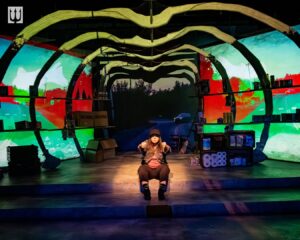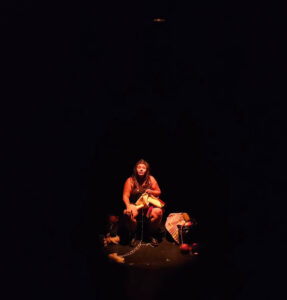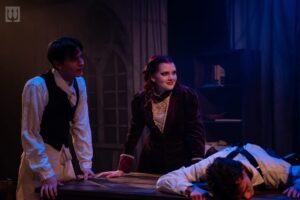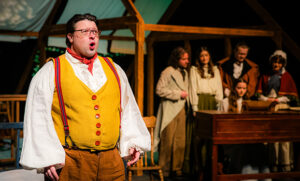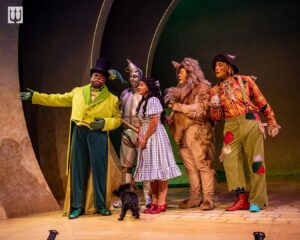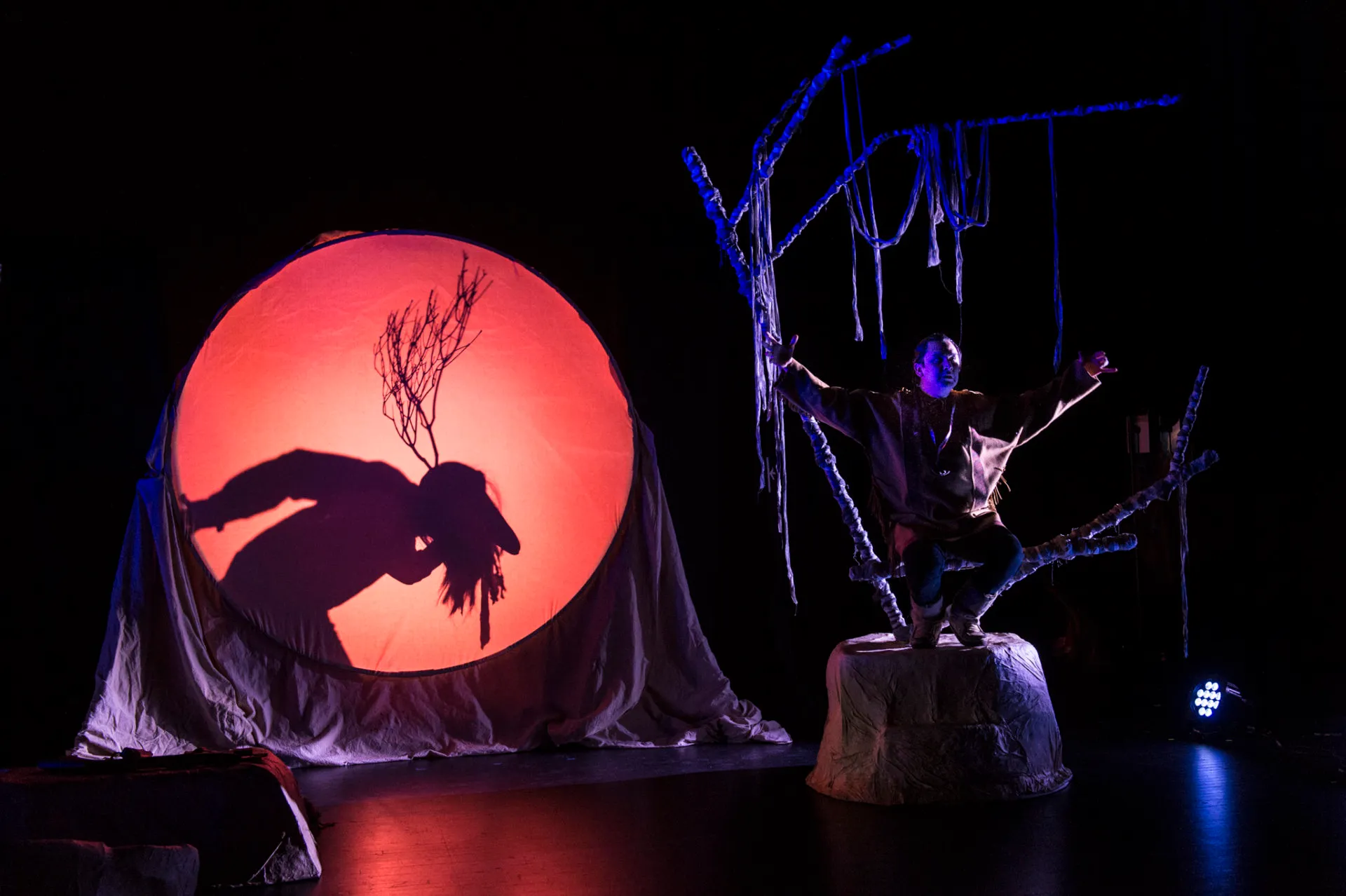
Photo by Donald Lee
The Prismatic Arts Festival is in full swing this week in various venues throughout Kjipuktuk (Halifax). Prismatic is a national multidisciplinary arts festival whose mandate is to showcase and celebrate work by Indigenous artists and artists of colour from across Canada. The festival has been bringing audiences here some of the best in theatre, dance, music, film, visual and media arts, and spoken word since 2008.
One of the most highly anticipated productions that is here as part of the festival, in a co-production with Neptune Theatre, is Akpik Theatre’s Pawâkan MacBeth, which has sold out the entire rest of its run at the Neptune Scotiabank Studio Stage. The play is a reimagined version of one of Shakespeare’s darkest plays “as Cree history, legend, and cosmology.” I spoke to Reneltta Arluk, the playwright and director of the play, and the founder of Akpik Theatre, which, like Prismatic, dates back to 2008.
Reneltta Arluk was born and raised in the Northwest Territories. Her mother is Denesuline and Cree from Treaty Territory Wood Buffalo Region, which is close to the Fort Chipewyan and Fort Smith regions in Alberta and The Northwest Territories. Her father is Inuvialuk from the Inuvialuit Aklavik region, which is “in the far, far, north of the Northwest Territories.” She was raised on the trap line by her grandparents, and raised on the land until she had to go to school. “A lot of my early memories are of being on the land, and in the bush, and hearing stories, and being surrounded by a lot of love from the grandparents,” she says, explaining how she wasn’t able to get into theatre in a direct way like those who are raised in more urban or southern regions. “I didn’t take drama, I didn’t take dance, I didn’t have ballet lessons,” she says, “but I had a lot of stories around me, so when I got older I started really looking at ‘how can we keep our culture going forward.’ There’s several experiences and situations where I just saw culture needing to live, and so I thought ‘well, what can I do to keep our culture living?’ and then I went, ‘well, for me, it’s naturally through storytelling’, and all theatre is is dramatic storytelling, so then I started taking a practice that was a very Indigenous perspective and [then] took a very Western approach by going into theatre school. So, I got theatre school training, but I always kept that lens that this applies to this, not this applies to that.”
Arluk was the first Indigenous woman to graduate from the prestigious BFA Acting Program at the University of Alberta, which at that time was a class of about twelve students, who were accepted into the program from a group of over 150 people who had auditioned. Arluk says that she had to learn how to “apply the mechanics of ‘stage right, stage left,’ when I was never raised with that kind of methodology. But now I’m very good at it,” she laughs heart-fully.
As most North American students do, Arluk encountered William Shakespeare’s work in school, and she revisited it during her time in theatre school. She was then hired to do a residency in Frog Lake First Nation, a Treaty 6 reservation, and was initially asked to do an adaptation of The Tempest with students. “I said, ‘okay, well, I’m not going to tell them what to do, but The Tempest, from an Indigenous perspective, is pretty problematic because of how they treat Caliban,” Arluk says, “So I was like, ‘I wonder how they’ll approach this with these students.’ Then, I got a call later on that said, ‘well they’re not interested in doing The Tempest cause they don’t connect to it, but we want to do MacBeth and we want to use the Cannibal Spirit as MacBeth, and we want to talk about greed.’ And I went, ‘wow, that’s huge power! and I wonder what kind of energy we want to bring into the room and work with young people on this play’, which is quite, quite dark. But, it’s not for me to tell anybody what to do, when you’re a guest, so I thought ‘okay, what we’ll do is we’ll make this an opportunity, and we’ll talk to Elders about the Cannibal Spirit, which we are telling in this play. So, we offered Elders tobacco and an honorarium and they came in and they shared stories of the Cannibal Spirit with the students, and the students, in turn, shared their stories, and it became a story share of young people sharing their stories with Elders, and Elders doing the same. The Elders were really touched, I could see it, that they were really touched that young people knew their own history, their own cosmology, and that young people were happy to impress Elders that were there. So, this ended up being a really positive experience.”
Arluk didn’t fully embed the MacBeth and the Cannibal Spirit concept with the students, but she left feeling inspired, and “wonder[ing] if it was possible to do this on a professional level… and if the impact would still be the same, which was two negatives make a positive.” Arluk mentions that in the Western theatre tradition there is a level of superstition around saying MacBeth’s name, often actors will refer to the play as “Mackers.” In a similar way for the Cree, the Cannibal Spirit, Wihtiko, is often referred to just as “The W.” Pawâkan MacBeth has both. And yet the result has been the exact opposite of the superstitions, “Every time we’ve ever done this work, whether it be a workshop, a reading, or a performance, the impact that it has on the company is always really, really positive, and so we just keep doing it,” says Arluk.
The play is set in Plains Cree territory in the 1870s, before Indigenous reserves were established, but, as Arluk says, “Sir John A. Macdonald exists, Indian Agents exist, and [some] treaties have been signed, but these Indigenous communities [in the play] are still sovereign.” Shakespeare’s witches become the Wiyôyôwakak, The Howlers: a half coyote half spirit character. They are featured more than the witches in MacBeth, as they “are driving the entire narrative of this piece,” says Arluk. The overall arc will be familiar to those who know MacBeth: against a grim backdrop of fear, starvation, wars between First Nations, and colonialism creeping further and further west Macikosisân plots with his wife Kâwanihot Iskwew to murder their Chief Okimâw Wîpâstim to benefit themselves.
Arluk says that while the students at Frog Lake First Nation wanted to focus on the theme of greed, when she started developing the work for professional actors she began to think more about “what makes us human, and what makes us, as humans, susceptible to energies like that?”
Pawâkan MacBeth has been performed in different incarnations throughout many other provinces since 2017, and audiences here in Mi’kma’ki are obviously as eager as I am to see it, since the entire rest of the run is sold out.
There are lots of other events, however, still ongoing as part of Prismatic, including Alan Syliboy’s film Wolverine and Little Thunder, on a 24 hour loop at Rogers Square until October 8th, Okan on Friday night at the Dalhousie Arts Centre, Logan Staats and Basset on Friday night at the Carleton. Please visit this website for more information.

